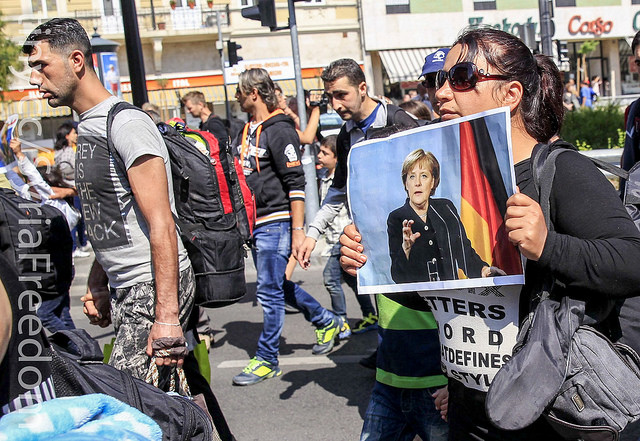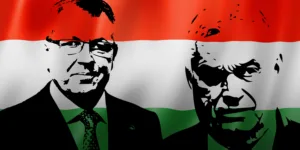 The Chinese media has lately paid quite a close attention to the EU’s refugee crisis. In general it is agreed that the crisis poses a threat to Europe’s humanistic ideals and economic situation. At the same time, it puts EU’s integrity and responsiveness at test (难民潮引发的经济社会问题和人道主义危机,已成为欧洲一些国家难以承受之重,也考验着欧盟内部的团结和应对能力). Indeed, almost a minute coverage of this crisis paid most attention to different standpoints among EU member states.
The Chinese media has lately paid quite a close attention to the EU’s refugee crisis. In general it is agreed that the crisis poses a threat to Europe’s humanistic ideals and economic situation. At the same time, it puts EU’s integrity and responsiveness at test (难民潮引发的经济社会问题和人道主义危机,已成为欧洲一些国家难以承受之重,也考验着欧盟内部的团结和应对能力). Indeed, almost a minute coverage of this crisis paid most attention to different standpoints among EU member states.
Although Austrian and German moves to accept certain number of refugeses were viewed in positive terms, it is argued that this has come around only due to international and domestic pressure (迫于国际国内舆论压力和人道主义呼声,德国和奥地利5日决定向滞留在匈牙利的数千名难民开放边). Most attention was paid to Germany, that tends to be described as an exemplary country (德国在维护社会的安定团结和化解危机方面的努力赢得了普遍的尊敬), often suggested to be acting as a European leader.
Merkel’s proclamation to accommodate refugees reaching Germany’s borders was highly praised. While the reasons why Germany has become the most popular destination were analyzed in detail, the problems faced by refugees were given equal attention. Yet, as Berlin is thought to be lingering between its welcoming culture and xenophobic violence (德国在欢迎文化与暴力排外之间徘徊), not even Germany may be thought of as an “ideal country” (德国并非真的是避难的“理想国). Reasons for such a claim are racial discrimination, ethnic intolerance and especially rightist extremism that seems to be the main root of these problems occurring with increasing frequency (极右翼暴力排外事件的激增).
At the same time, however, Chinese media cite German leftist parties claiming that Europe’s involvement in American destabilization of the areas of refugee’s origin has nurtured the current crisis (巴尔奇在立场文件中指出,西方国家在美国的带领下破坏了有关地区稳定,后果包括令恐怖组织滋生和泛滥成为可能). Indeed, the notion of the negative involvement of the USA is supported by giving space to Putin’s remarks suggesting that current refugee crisis is an inevitable outcome of EU’s policy (following the U.S.) towards respective regions that could have been predicted long ago (“早料到会发生这种事”,难民潮是欧洲国家在中东和北非外交政策的“必然结果”).
Attention was also paid to the countries who have expressed opposition to the EU’s quota system. Particular attention was paid to the meeting of Visegrad countries voicing their position as a group. Czech PM Sobotka was often cited that the quota plan is not a viable solution. These countries were looked down upon with disapproval by the Chinese press. It is possible to find articles going so far as striking a comparison between actions of the Czech police and Nazi Germany (捷克警方在难民手上写编号 被指似纳粹集中营). The importance of law and order that the refugees should respect was stressed as well. Remarks of the Czech president Zeman that “Once the refugees are admitted to our countries, they should obey the rules in these countries” were, however, presented without any further commentaries.
Hence, the most prominent idea is that there are diverging attitudes towards this crisis both domestically, and also internationally as there are gaping differences among individual EU member states. These articles claim that Europe is being torn apart by refugees (难民潮撕裂欧洲) as every single state only pursuesitss own interest while cheating on the others (撕裂之二,欧洲各国出于各自利益和算计,互相尔虞我诈). Furthermore, it is argued that another reason for EU’s schism is the institutional and political inability to stand up to its proclaimed humanistic values, suggesting that the EU, after all, only follows its interests. In this sense, all levels of politics in the EU were described in terms of pure political realism where the Union as a whole, its members as its basic units, as well as the domestic constituencies only follow their own interests. These have been demonstrated not only by violent behavior in respective states but also by the position of the UK. The EU’s inability to reach a solution to this problem is clearly linked to Britain’s out-of-EU polls (欧洲难民问题加剧英国赞成脱欧人数首度领先).
Despite such critical approach, it should be noted that China is not anti-EU – quite to the contrary. Xinhua, for example, is calling for courage and unity, as its generally supportive of the whole integration project (歐洲國家需要展示“勇氣與團結”). The reason for such a fraught portrayal of the EU is most likely an effort to paint the world beyond Chinese borders in problematic terms and to polish the image of strong China. At the same time, China generally supports pro-migrant policies on the part of the EU and looks down upon any disruptive elements in the European integration process.
Image credit: Flickr, Freedom House





